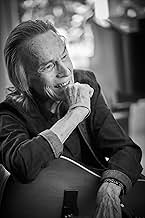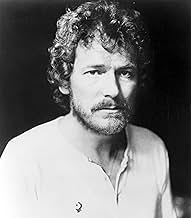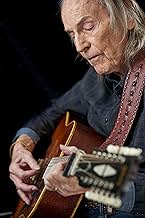IMDb-BEWERTUNG
7,8/10
744
IHRE BEWERTUNG
Füge eine Handlung in deiner Sprache hinzuThe iconic Canadian musician, Gordon Lightfoot, reflects on his life and career.The iconic Canadian musician, Gordon Lightfoot, reflects on his life and career.The iconic Canadian musician, Gordon Lightfoot, reflects on his life and career.
- Regie
- Drehbuch
- Hauptbesetzung
- Auszeichnungen
- 5 Nominierungen insgesamt
Empfohlene Bewertungen
Singer/songwriter, Gordon Lightfoot (born 1938) is definitely one of my very favorite Canadian musicians of his generation, bar none.
There are so many of Lightfoot's songs that I enjoy listening to on a regular basis. I have the greatest respect for this man and his music.
Through stills, archival footage, and interviews (including those with Lightfoot) - This informative bio-documentary takes a close-up look at the life and career of a true Canadian icon, Gordon Lightfoot.
There are so many of Lightfoot's songs that I enjoy listening to on a regular basis. I have the greatest respect for this man and his music.
Through stills, archival footage, and interviews (including those with Lightfoot) - This informative bio-documentary takes a close-up look at the life and career of a true Canadian icon, Gordon Lightfoot.
Been listening to Gordon Lightfoot since I was kid. My mom bought us these old lunchbox sized radios and we could only get AM stations on 'em. The one that stood out was a canadian station that played Adult contemporary with a little folk mixed in. Those tunes are stuck in my mind to this day and Gordon Lightfoot was one of the artists I vividly remember. Everytime I hear one his classics I am instantly transported back to my childhood. Loved the documentary. Learned alot about Mr. Lightfoot that I had no idea about. Thought it ran a little long but there is much story there to tell. Thank you Gordon for your impressive life of art. A musician in the truest sense.
You know those Heritage Minutes about Canadian history? This felt like that but drawn out over a feature length documentary. Talking heads, over and over, about how Lightfoot was great. Yes, he was a great songwriter and musician. I think you can understand that by listening to a couple of his best songs. You don't need that over and over again from different people in a feature length documentary, though. It was cool to see Rush come in, and also Neil Young, but WHY was Alec Baldwin in this so much? He just seemed a bit random and out of place. Is he just a Lightfoot fan? OK, but that could have been explained somehow. Context is good.
Look, a great documentary should have some drama to it, some mystery, some narrative drive. This doc is more of a straightforward retelling of Lightfoot's career, song by song, and talking about the mechanics of the songwriting. This could be of interest to musicians, perhaps, but not most moviegoers. There isn't enough intrigue here.
Look, a great documentary should have some drama to it, some mystery, some narrative drive. This doc is more of a straightforward retelling of Lightfoot's career, song by song, and talking about the mechanics of the songwriting. This could be of interest to musicians, perhaps, but not most moviegoers. There isn't enough intrigue here.
Very easy to forget Lightfoot's contribution to popular music. One masterpiece after another. Very much worth watching, particularly if you have never made an acquaintance with his music (in which case, you may discover that you know more than you thought).
Greetings again from the darkness. We realize very quickly that octogenarian Gordon Lightfoot isn't about to cater to co-documentarians Martha Kehoe and Joan Tosoni, or establish a new reputation as being a sweetheart at this stage of life. Instead he is filmed with his third wife Kim, watching clips of young Gord singing "(That's What You Get) For Loving Me". Despite his singing it with Johnny Cash, or having the song covered by Peter, Paul and Mary, Waylon Jennings, and many others, Lightfoot cringes and says. "I hate that song." That's what we get here - a man who speaks directly about his regrets, yet one who is appreciative of his life.
Lightfoot is thought of as Canadian Royalty, and is often referred to as the best ever Canadian singer-songwriter. He certainly played a key role in the popularity of folk music in the 1960's, and we hear about his influence from many important Canadian musicians, including: Geddy Lee, Sarah MacLachlan, Tom Cochrane, Ronnie Hawkins, Burton Cummings and Anne Murray. For some inexplicable reason, the filmmakers include an interview with actor Alec Baldwin, who is neither Canadian, nor a musician - though at least he does seem to be a fan of Gordon Lightfoot.
The profile skips over much of his personal life to focus on the music. In fact, initially it seems like Gord is going to walk us through his songbook, one by one. With "Early Morning Rain", we learn it was not only a hit for Lightfoot, but covered by others such as Judy Collins, Elvis Presley, Neil Young, and even Ian and Sylvia (a successful Canadian folk duo). It's also at this point when Burton Cummings explains that it was Lightfoot's songs that inspired The Guess Who to write their own songs. We also see a clip of a young Lightfoot being interviewed by an even younger DJ named Alex Trebek!
Anne Murray and Sarah MacLachlan discuss "Song for a Winter's Night", and Lightfoot explains how he isolates to write songs ...and he "waters" his guitars (something that makes more sense seeing than reading). Gordon tells the story of how he quit a promising career in banking to take a chance on performing, and he relates how growing up in the country helped him when he moved to the city. He also tells the fascinating "behind the scenes" story of how the record company changed the name of his first album after "If You Could Read My Mind" became a hit on the radio. By the way, that song has been recorded by a slew of artists - so many that the filmmakers offer up a slide show to make the point.
Photographs give us a taste of some of Lightfoot's infamous parties attended by various celebrities. It was this partying lifestyle that led to drugs and alcohol abuse, as well as his weight gain. Lightfoot talks about his 3 year affair/relationship with Cathy Evelyn Smith, a name you might recognize as the woman who injected John Belushi with the lethal "speedball" that killed him. It was his severe jealousy over Ms. Smith that led Lightfoot to write his biggest U.S. hit "Sundown." There is also an entire segment on Bob Dylan, and how much respect each of the songwriters had/have for each other.
Yet another "behind-the-scenes" moment occurs when one of Lightfoot's band members recollects the time they recorded "The Wreck of the Edmund Fitzgerald." They had never even rehearsed the song, and yet it was the first take in the studio that ended up being the hit version. Also included is a segment where Lightfoot reminisces about his childhood in Orillia, and we get a brief clip of his mom and dad. Even more shocking is the included recording of Lightfoot as a kid, singing with the church choir. The high pitched soprano voice bears little resemblance to the soothing tones of an older Gordon.
As a poet-singer-songwriter, few have been better or had more success than Gordon Lightfoot. The film skims over much of his personal life and his severe health issue in 2002, but focusing on the music is what his fans want - and it's a treasure trove of early performances, clips, and photographs. He's now 81 years old, and the filmmakers don't shy away from contrasting his singing voice on "If You Could Read My Mind" with a 'then and now' edit. Lightfoot admits to regrets, and also states "I appreciate having been alive." Still sporting that renowned attitude, he undoubtedly enjoys hearing Diana Krall and Sara MacLachlan open the film with the titular song. A Canadian national hero indeed. As a bonus, we southerners finally learn the meaning of "Gitche Gumee."
Lightfoot is thought of as Canadian Royalty, and is often referred to as the best ever Canadian singer-songwriter. He certainly played a key role in the popularity of folk music in the 1960's, and we hear about his influence from many important Canadian musicians, including: Geddy Lee, Sarah MacLachlan, Tom Cochrane, Ronnie Hawkins, Burton Cummings and Anne Murray. For some inexplicable reason, the filmmakers include an interview with actor Alec Baldwin, who is neither Canadian, nor a musician - though at least he does seem to be a fan of Gordon Lightfoot.
The profile skips over much of his personal life to focus on the music. In fact, initially it seems like Gord is going to walk us through his songbook, one by one. With "Early Morning Rain", we learn it was not only a hit for Lightfoot, but covered by others such as Judy Collins, Elvis Presley, Neil Young, and even Ian and Sylvia (a successful Canadian folk duo). It's also at this point when Burton Cummings explains that it was Lightfoot's songs that inspired The Guess Who to write their own songs. We also see a clip of a young Lightfoot being interviewed by an even younger DJ named Alex Trebek!
Anne Murray and Sarah MacLachlan discuss "Song for a Winter's Night", and Lightfoot explains how he isolates to write songs ...and he "waters" his guitars (something that makes more sense seeing than reading). Gordon tells the story of how he quit a promising career in banking to take a chance on performing, and he relates how growing up in the country helped him when he moved to the city. He also tells the fascinating "behind the scenes" story of how the record company changed the name of his first album after "If You Could Read My Mind" became a hit on the radio. By the way, that song has been recorded by a slew of artists - so many that the filmmakers offer up a slide show to make the point.
Photographs give us a taste of some of Lightfoot's infamous parties attended by various celebrities. It was this partying lifestyle that led to drugs and alcohol abuse, as well as his weight gain. Lightfoot talks about his 3 year affair/relationship with Cathy Evelyn Smith, a name you might recognize as the woman who injected John Belushi with the lethal "speedball" that killed him. It was his severe jealousy over Ms. Smith that led Lightfoot to write his biggest U.S. hit "Sundown." There is also an entire segment on Bob Dylan, and how much respect each of the songwriters had/have for each other.
Yet another "behind-the-scenes" moment occurs when one of Lightfoot's band members recollects the time they recorded "The Wreck of the Edmund Fitzgerald." They had never even rehearsed the song, and yet it was the first take in the studio that ended up being the hit version. Also included is a segment where Lightfoot reminisces about his childhood in Orillia, and we get a brief clip of his mom and dad. Even more shocking is the included recording of Lightfoot as a kid, singing with the church choir. The high pitched soprano voice bears little resemblance to the soothing tones of an older Gordon.
As a poet-singer-songwriter, few have been better or had more success than Gordon Lightfoot. The film skims over much of his personal life and his severe health issue in 2002, but focusing on the music is what his fans want - and it's a treasure trove of early performances, clips, and photographs. He's now 81 years old, and the filmmakers don't shy away from contrasting his singing voice on "If You Could Read My Mind" with a 'then and now' edit. Lightfoot admits to regrets, and also states "I appreciate having been alive." Still sporting that renowned attitude, he undoubtedly enjoys hearing Diana Krall and Sara MacLachlan open the film with the titular song. A Canadian national hero indeed. As a bonus, we southerners finally learn the meaning of "Gitche Gumee."
Wusstest du schon
- WissenswertesNumerous musicians are interviewed in the film to provide their thoughts on Gordon Lightfoot, those musicians including Sarah McLachlan, Geddy Lee (of Rush), Randy Bachman, Burton Cummings, Tom Cochrane, Anne Murray, Ian Tyson, Sylvia Tyson, Murray McLauchlan, and Greg Graffin (of Bad Religion). Archive footage of other musicians, such as Bob Dylan, talking about Lightfoot is also included.
- PatzerWhen Murray McLachlan is describing the apartment building in Toronto on Alexander Street, where Gord was living at the time, he said the apartment building was round like the old Decca Records building in L.A. The round building in L.A. is actually The Capitol Records building on Vine Street in Hollywood.
- VerbindungenReferences Harry Tracy - Der letzte Desperado (1982)
Top-Auswahl
Melde dich zum Bewerten an und greife auf die Watchlist für personalisierte Empfehlungen zu.
- How long is Gordon Lightfoot: If You Could Read My Mind?Powered by Alexa
Details
- Laufzeit1 Stunde 31 Minuten
- Farbe
- Seitenverhältnis
- 1.33 : 1
- 1.85 : 1
Zu dieser Seite beitragen
Bearbeitung vorschlagen oder fehlenden Inhalt hinzufügen


































